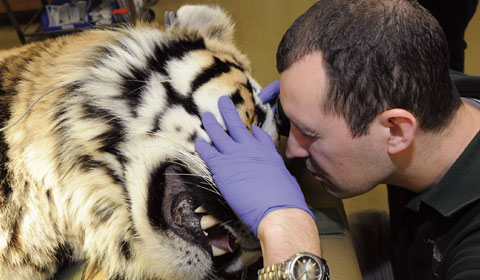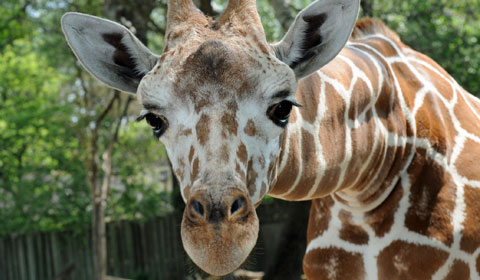News Release
Contact: Sondra Katzen, Public Relations, 708.688.8351, sondra.katzen@czs.org
February 5, 2018
FOR IMMEDIATE RELEASE
Mexican Wolves at Brookfield Zoo Undergo Reproductive Procedures
as Part of Recovery Program for the Species
Images and captions can be downloaded below.
Brookfield, Ill. –The Chicago Zoological Society’s (CZS) veterinary staff, alongside a team assembled by the Reproductive and Behavioral Sciences Department from Saint Louis Zoo, are working to further advance the science of artificial reproduction to help save an endangered species—the Mexican wolf. Zana, a 5-year-old Mexican wolf at Brookfield Zoo was artificially inseminated with a donor wolf’s frozen semen that had been stored at a gamete (genetic) bank at Saint Louis Zoo. The team also collected semen from the zoo’s seven male Mexican wolves, which will be frozen and banked for future use. These innovative procedures took place per a recommendation from the Association of Zoos and Aquariums’ Mexican Wolf Species Survival Plan and the United States Fish and Wildlife Service (USFWS) as part of the recovery program for the species.
“The Chicago Zoological Society is dedicated to the conservation of wolves and advancing the science of animal care. We are pleased to have an opportunity to support the development of these pioneering procedures that will help improve the genetic health of the population in the wild and in professional care,” said Joan Daniels, curator of mammals for the Society. “Animal care specialists will carefully monitor Zana over the next two months for signs of a developing pregnancy.”
The gamete bank holds semen samples from hundreds of male Mexican wolves collected over the last 20 years. Zana was paired with a male from the bank according to their genetic compatibility. There have been many successes in the population utilizing fresh semen from a donor. However, artificial insemination utilizing frozen semen is fairly new for this species and the technique is still being perfected. All aspects of the procedure—the freezing and thawing of the semen and determining what the optimal time is for inseminating the female—need to be properly synchronized.
“The success rate of using frozen semen to artificially inseminate female wolves will determine whether it is a viable option for breeding recommendations for the species,” said Cheryl Asa, Ph.D., associate scientist and former director of research at Saint Louis Zoo. “If the percentage rate is high, it could be very beneficial to the program’s future.”
“We’re pleased that the Mexican Wolf Species Survival Plan is engaging in this important research. Brookfield Zoo’s effort will help us in developing similar techniques to improve the gene diversity of the wild population, which is important to Mexican wolf recovery,” said Sherry Barrett, coordinator of the Mexican Wolf Recovery Program for the USFWS.
Since Mexican wolves mate for life, conducting the artificial insemination procedure at Brookfield Zoo allows Zana to stay with her mate, Flint, and the rest of the pack, while improving the genetic diversity of the overall population. Because Zana and Flint are socially bonded, the percentage is extremely high of him accepting a litter of puppies that he did not sire. This is the case with two wild-born puppies that were cross-fostered into Zana and Flint’s litter born in 2017. The pair also produced litters in 2015 and 2016.
The semen collected from the seven male wolves—Mateo, Jeff, David, Temp, Flint, Rio and Azul—was done over the course of two days. Their semen may be used for future artificial inseminations on wolves in the wild and/or in professional care.
Mexican wolves were nearly extirpated in the 1970s leaving fewer than 10 individuals in the wild population. “The possibility of being able to use semen from a now deceased animal creates an incredible opportunity to improve the species’ genetic diversity. The existence of the Mexican wolf—an apex predator—is vital for maintaining a healthy ecosystem in the southwest United States,” added Daniels.
CZS, which manages Brookfield Zoo, has been a partner in the USFWS’s Mexican Wolf Recovery Program since 2003, and has contributed by collaborating on two cross-fosterings of puppies born at the zoo as well as the release of one of its adult females to the wild, who subsequently had a litter of pups.
Mexican wolves are the rarest subspecies of gray wolves in North America. Approximately 4,000 wolves once lived in their historical range, which included central and northern Mexico and the southwestern United States. In 1976, the USFWS added the species to the Endangered Species List. As of August 2017, the population of the species in professional care is 281 individuals in 55 institutions. There are currently a minimum of 113 Mexican wolves living in the wild in the U.S. and approximately 31 in Mexico.
# # #
About the Chicago Zoological Society
The mission of the Chicago Zoological Society is to inspire conservation leadership by connecting people with wildlife and nature. The Chicago Zoological Society is a private nonprofit organization that operates Brookfield Zoo on land owned by the Forest Preserves of Cook County. The Society is known throughout the world for its international role in animal population management and wildlife conservation. Its Center for the Science of Animal Care and Welfare is at the forefront of animal care that strives to discover and implement innovative approaches to zoo animal management. Brookfield Zoo is the first zoo in the world to be awarded the Humane Certified™ certification mark for the care and welfare of its animals, meeting American Humane Association’s rigorous certification standards. Open every day of the year, the zoo is located at 8400 31st Street in Brookfield, Illinois, between the Stevenson (I-55) and Eisenhower (I-290) expressways and is also accessible via the Tri-State Tollway (I-294), Metra commuter line, CTA and PACE bus service. For further information, visit CZS.org.
Photo Captions (credit: Chicago Zoological Society)
0404.jpg and 0425.jpg: The Chicago Zoological Society’s veterinary staff prepare a Mexican wolf at Brookfield Zoo for a procedure in which his semen will be collected, frozen, and banked for future use to help improve the genetic diversity of the population both in the wild and professional care as part of the United States Fish and Wildlife Services recovery program for the species. The Society has been a part of the Mexican Wolf Recovery Program since 2003.
0530.jpg: The Chicago Zoological Society’s veterinary staff work alongside a team assembled by the Reproductive and Behavioral Sciences Department from Saint Louis Zoo to collect semen from a Mexican wolf at Brookfield Zoo. The procedure is being done to further advance the science of artificial reproduction to help save the endangered species.
0576.jpg: Bruce Christensen, DVM, MS, a board-certified theriogenologist and reproductive physiologist, examines the semen quality collected from a Mexican wolf at Brookfield Zoo, while Karen Bauman, MS, a reproductive biologist from Saint Louis Zoo, prepares a sample of the wolf’s semen for evaluation. If vital the semen will be frozen and banked at the Reproductive and Behavioral Sciences Department at Saint Louis Zoo for future use to improve the genetic diversity of the Mexican wolf population in the wild and professional care.
0586.jpg: Cheryl Asa, Ph.D., associate scientist and former director of research at Saint Louis Zoo, examines the semen quality collected from a Mexican wolf at Brookfield Zoo. If vital the semen will be frozen and banked at the Reproductive and Behavioral Sciences Department at Saint Louis Zoo for future use. The gamete (genetic) bank holds semen samples from hundreds of male Mexican wolves collected over the past 20 years.
1929.jpg: Sathya K. Chinnadurai, DVM, MS, senior staff veterinarian for the Chicago Zoological Society, monitors Zana, a 5-year-old Mexican wolf, who is being artificially inseminated with a donor wolf’s frozen semen that had been stored at a gamete (genetic) bank at St. Louis Zoo.
2114.jpg and 2219.jpg: Bruce Christensen (background), DVM, MS, a board-certified theriogenologist and reproductive physiologist, performs an artificial insemination procedure on Zana, a 5-year-old Mexican wolf at Brookfield Zoo, as Chicago Zoological Society veterinary staff monitors the animal. The semen being used is from a donor wolf whose frozen semen had been stored at a gamete (genetic) bank at St. Louis Zoo. The procedure allows Zana to stay with her mate at Brookfield Zoo, while improving the genetic diversity of the overall Mexican wolf population. The collaboration between the Chicago Zoological Society and the team assembled by the Reproductive and Behavioral Sciences Department at Saint Louis Zoo is part of the United States Fish and Wildlife Services recovery program for the species.
MEDIA CONTACT:
Sondra Katzen
Director of Public Relations
Office: 708-688-8351
Cell Phone: 708-903-2071
E-mail: Sondra.Katzen@CZS.org

Read about our innovative practices in animal welfare to ensure the ultimate care of our individual animals.

Create extraordinary connections with animals and nature!

Become our partner in caring for animals and in connecting people with wildlife and nature.